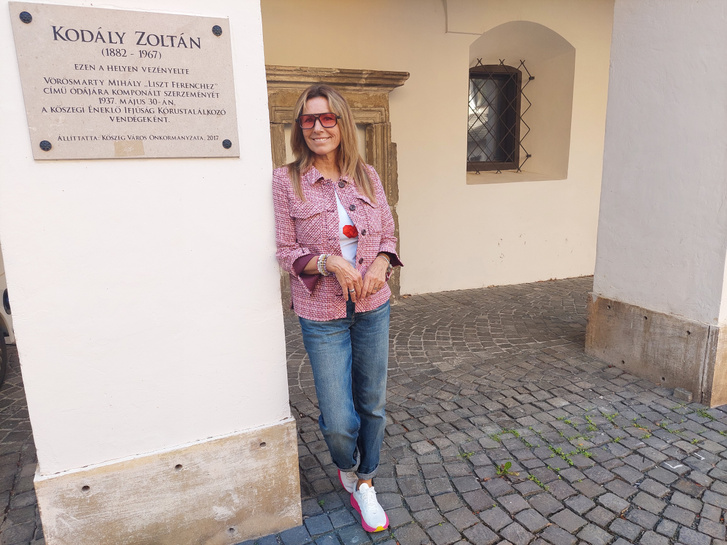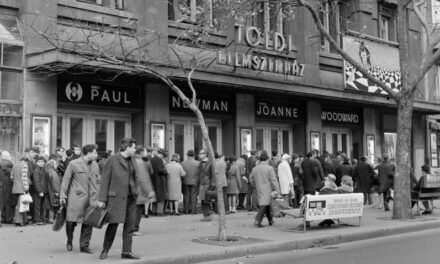The harsher the world around us is, the more we have to take care of each other, our small communities.
The audience sang, breathed, sometimes cried or laughed together with Erika Miklósa in Kőszeg, when she gave a concert in one of the smallest synagogues in the country - recently beautifully renovated and functioning as a cultural space. The diva who conquered New York's Metropolitan at a young age, the woman who became stronger through many trials and the girl from Kiskunhalas, who set out to conquer the world at the age of 19, were standing on the small stage at the same time. In the interview, he said: in addition to the Opera general director's application, he is starting training for talented young singers.
"Do they know what is most important in life?"
Erika Miklósa asked the audience in Kőszegen, and on that evening, when daylight was no longer filtering through the arched windows of the synagogue and all eyes were on her, we really felt that we were about to find out the answer, because this brave, strong and successful woman certainly you know
It is true that we can only know him from TV, the press and the stages, we hear him speak in a highly watched talent show, but he is as kind and direct as if he were a close acquaintance of ours. He just got out of his car a few hours ago in jeans, trainers, with a colorful leather bag on his shoulder, and before we even thought it was some expensive Spanish brand, he immediately told us the story of the bags in Csikszereda - he had performed there a few days earlier. Then he started walking briskly, but with Zoltán Pócza, the director of the Kőszeg Castle Theatre, on whose invitation he came to the city, we could hardly follow him.
I've been doing sports all my life, and now I run almost every day, even if everything hurts at the end. But at least I know I'm alive
- laughed the world-famous coloratura soprano, who also brought running shoes, as there are nice places for running in the Alpokalja on the border of Kőszeg.
Fügelekvár with honor fund
Kőszeg is like a fairytale town, and there is no exaggeration in that. The neat houses in the main square, the plaques commemorating various events, the monuments, the castle block, which is both an integral part of the city and provides an intimate – and perfect acoustics – environment for performances in the castle theater, Géza Ottlik's school, the cats, but most of all the small portages due to which they are just exposed in front of the houses. Figs, roasted chestnuts, and freshly picked raspberries are waiting on the tables with a jar or box each - in not many cities would the honor fund work like this.
Everyone on the street greets, or at least smiles, Erika - who immediately bought a bag of beautiful, big-headed chestnuts - is recognized by many, even from across the street they wave at her saying
SEE YOU AT THE EVENING CONCERT!
The restaurateur also says goodbye after lunch in the same way, but the shopkeeper, the flower seller, the receptionist also greet the small group in such a way that we will meet at the evening concert anyway - it is true, there are also those who regretfully say that they have not received tickets. The city, which has gotten used to seeing high-quality productions thanks to the Kőszeg Castle Theater, looks forward to Erika Miklósa's evening performance with excited anticipation.
The majority of the audience probably doesn't know them from The Voice, but the fact that the jury member - coach in the show - who always has a good word or two for the contestants and who perhaps helps to "tame" the two rappers, makes the evening special. has something to do with it, he will sing at arm's length from them. The singer receives a lot of feedback about how much she does to popularize opera as a genre by appearing in the show, but that's not the only reason they write to her.
"I receive letters - says the artist - from girls and boys, from home and abroad, about how much the show means to them, and what advice I have, how they can improve and move forward in singing."
Even at low points
There is no shortage of talent, and the need for someone to help them in their careers is evident. This is also why Erika Miklósa decided to focus on teaching and talent management in the next phase of her life. Exactly where and within what framework is being shaped now, but he wants to pass on everything he has learned on the field: not everyone has to figure out the many little tricks that he figured out on his own and that helped him in the performing arts field from New York Through Milan to the Far East. For example, it is not enough to perform at the Opera twice a year, because in order to fill such a large space, you need strength, muscles, air, and this cannot be maintained at home with scaling - true, this depends on the singers in the least.
What is included in learning, movement, eating, stage presence, but most of all the development of personality, which in Erika Miklósa's career has been put together into a system based on experiences.
You don't have to be like me: you have to be who you are
he explains. And he can tell a lot about this self-identity, starting with the fact that at the age of 19 he received a contract after a public audition and thus became the youngest private singer of the Opera House of all time, through how he was able to stand his ground in the world in a coordinate system that is quite different from that of ordinary people of the stars , to the point of how to represent your own values even when you find yourself in difficult decision-making positions, when instead of success you are faced with failure, disappointment, or rejection.
"This is an inspiring program that, I'm sure, will raise talent to a new level," says Erika Miklósa, adding that this profession requires not only thorough training, but also continuous self-development. – You can never stop learning, I have already tried to convey this in various areas of talent management. Versatility is important because it opens up possibilities for the artist.” With its all-encompassing attention, mentoring will help young people in complex, functional thinking and in the development of coping strategies, since talent is not always a light "burden". Her singing teacher, Júlia Hamari, said to her at the time:
it's not easy being a sparrow with a red cap.
In the talent show, he also talks about himself and the low points he has experienced in life, because he also gives strength to others. "I also learned a lot from the opera's general director application," he tells Index. "We consulted with my team constantly, and it may sound strange, but I learned what it's like to be a good leader," he says, and at that time we didn't even talk about the human reactions he experienced, that it became clear who could be counted on and who not, who how he behaved before, after and during the application. And yes, there were difficult moments, even days and weeks, especially when - in retrospect - many people started saying how good it would have been if he had won the position of the Opera's general director.
Tree of fate
While we are walking and talking, we also visit the garden of György Bakos - he once founded the Kőszeg Castle Theater - where Erika Miklósa immediately recognizes the tree of fate at the entrance. "We have one too, with huge flowers," he says, and watches with interest as György tears off a sprig of Bolivian chili because, unlike the chocolate habanero, they don't have one at home.
I bring it home to my husband, we are big chili fans
he says and tells us what kind of creams are made from it. But they make wine, stuff sausage, and Erika also does a lot of gardening. When things got really complicated, she said that she would rather just "walk the land like a real peasant girl", after all, she would soon become a farmer with golden ears, but her husband said that it would not be for her: it was not her path.
And indeed, he goes, sings, performs, talks, fulfills all kinds of requests. The smaller the town he is invited to, the more likely he will go, because otherwise, when will they have the opportunity to hear opera and talk to him? And surely people also know that his popular music history program has been removed from public television - the artist awarded with the Order of St. Stephen, winner of the Kossuth and Ferenc Liszt Prizes is also asked about this.
“When I go to schools to talk, I don't always sing, unless I'm asked to. The other day, I sang a folk song, and a little boy listened to it without even taking a breath. He said he felt the air vibrate around him"
- says Erika.
You could also feel that the air was vibrating in the Kőszeg synagogue. Incidentally, the concert took place when they were in Kőszeg during the shooting of one of the Score broadcasts, and when Erika saw one of the smallest synagogues in the country, similar to a jewelry box, now beautifully renovated and functioning as a cultural space, she said she wanted to sing here. Zoltán Pócza and his team – Ildikó Gelencsér and Zoltán Bakos – organized it.
On the afternoon of the concert, the chairs were packed in the synagogue, and in the evening the guests were welcomed with champagne and scones in the garden of the synagogue built by Fülöp Schey in 1859: there were the shopkeeper, the restaurateur, the receptionist and the flower seller, the citizens of Kőszeg, who for one evening they indulged in the enjoyment of operas and other well-known melodies, and the fact that they could "talk" with Erika Miklósa.
The most important thing in life
Because although he sang with world stars (and will sing again on November 29, 2023 at the Budapest Arena with José Carreras) and received the biggest domestic awards - not to mention how many important committees and boards he is a member of - we really feel like he is kind he would sing for us as an acquaintance. He also talked to the audience when he conferred with the pianist Miklós Harazdy, who accompanied him at the concert, and the eighty-three-year-old world-famous violinist Ernő Sebestyén (who, after finishing his work with the Berlin Philharmonic, settled in Kőszeg), as if we were at some kind of house concert.
Miklósa Erika Kőszegen sang opera arias, folk songs, and even operetta, Szilvia's entry from The Csárdáskirályő. Excerpts from Carmen and Traviata were sung, and when the folk song beginning under the Csitár mountains followed, Erika Miklósa encouraged the audience to sing bravely. And when he asked them what is the most important thing in life, he got the answer that it was love, love - that's when Monnot sang his song Hymnusz a szerelom, which we are most familiar with in Edith Piaf's performance.
The harsher the world around us is, the more we have to take care of each other, our small communities.
"I was greeted with such kindness, love and attention everywhere and at the concert in the evening that I was completely recharged," wrote Erika Miklósa on her Facebook page after the evening. "Because sometimes you get drained." Not even from a lot of work, but rather from bad words, lack of peace, inability to dialogue, injustice, hurt, arrogance, arrogance, disrespect. And then one will have enough. I've had enough too - not too long ago. But then, somehow, invitations arrive at just the right time - including from small communities that are also proud of their own values - from which I regain my spiritual and mental strength."
In view of the success, the singer will perform on the main stage of the Kőszeg Castle Theater this summer: it is certain that those who may have missed it will also be able to fit in there.













